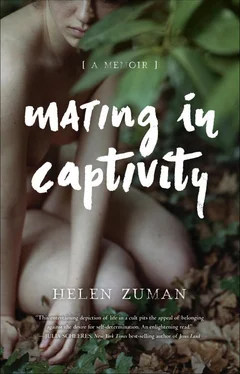The door stood ajar. I knocked.
“Come in!” she called.
She sat facing me, in her robe of royal purple, sections of the Charlotte Observer layering the kitchen table. Her hair hung loose around her shoulders. The rising sun brightened the leaves of the linden tree at the window behind her. She raised her teacup to her lips and sipped.
I stopped just inside the doorway. She didn’t motion me to sit down or come closer.
“I’m going to Idaho for two weeks. To see the mountains.”
“What, do you need a vacation?”
We both knew only squares took vacations. Why would anyone lucky enough to live at the Farm want a break from our rustic oasis? Still—maybe her X-ray vision would reveal the love beneath my choice to leave: I’d lost heart for Zendik, through my fault. I wouldn’t burden it with my misery. Instead, I’d disappear and find a fix, then return cleared to love it better, surrender with joy to its every need.
“Yes,” I said, “and I was wondering if I could take three hundred dollars’ worth of ammo to sell in Asheville.” Three hundred dollars would cover a round-trip bus ticket to Boise, with something left over for food.
She nodded, lips in a flat line. Her gaze cut to the doorway behind me. Fresh footfalls in the hall signaled the end of our audience. I turned to go, hoping my story would hold.
[ chapter 8 ]
Hunting Season
THAT AFTERNOON IN ASHEVILLE, my travel plan unraveled.
Selling alone was like going naked in a dream: Though no one notices you forgot to put your clothes on, you still feel shamefully exposed. How was I to approach strangers with neither the cloak of the first person plural nor the cover story of saving the world?
Normally, I would have said, “We’re a bunch of artists, we live on a farm, we think the world’s fucked up, so we’re starting a revolution. We get donations for our art—it’s how we keep our farm going.” I would not have used the word “I”; “I” did not matter. Now, I was it. But I didn’t make for an inspiring pitch: “I live on this farm about an hour from here, but lately things have been rough, so now I’m raising money for a bus ticket.”
Early in the evening, it started to rain. I quit with $67 in my pocket. Sheltering in the doorway of a closed storefront, I faced the obvious, with fear and excitement: I could still make Boise in the next few days. But I would have to hitchhike.
I’d thumbed rides before, both to save money and reach out-of-the-way places. I knew that the currency of hitchhiking was sociability: once drivers got to know and like you, they might go the extra mile or two, feed you, offer you a place to sleep. I also knew that hitching could be risky. Plenty of drivers had picked me up, they’d said, to keep me from predators ready to pounce on a woman alone.
The distance from Asheville to Boise far exceeded any I’d hitched in the past—and my years at the Farm seemed to have prepared me for just such a leap. Selling could have been boot camp for stranger engagement. Plus, the law of psychic cause and effect held that I could repel danger by policing my vibrations. So long as I stayed tied to Zendik—source of love and truth—I’d be safe. I’d attract attack only if my link to Zendik frayed.
Other hitchhikers had told me that if you wanted to book it cross-country, truckers were your best bet. They took speed and drove all night (the legend went), and when your paths diverged they could get on their CB radios and find you an onward ride. Theoretically, flagging down one semi could set you up for a couple thousand miles.
My sources—all male—either had not known or had not told me the whole story.
The first trucker to pick me up, on I-40 near Asheville, offered me a hundred bucks for a blow job. I demanded that he stop the truck and let me out. He backed off and apologized, protesting that some women did sell sex out on the highway. Near Nashville, he got me an onward ride.
Another trucker suggested I get some rest while he drove. Exhausted—and expecting him to drive all night, on speed—I stretched out, fully clothed, on the bed in the back of the cab. A couple hours later, at a rest stop in Kansas, he stripped and lay down next to me. I stiffened. What did he want? Would he grab me if I tried to climb out? Within minutes, he was snoring. I squirmed against the cab’s back wall, clearing a sliver of buffer between his skin and my clothes, then inched over him into the front seat and tried the door. It opened. My pack was at my feet, where I’d left it. At dawn, I slipped back to the road.
Halfway across Nebraska, I found a ride all the way to Ogden, Utah—just hours south of Boise—with a married Christian who sincerely and unsanctimoniously embraced the chance to praise Jesus by caring for a sister in need. When we shared the bed in his cab overnight, he kept his clothes on and gave me all the space he could. In our eight hundred miles together, he did nothing to breach my trust.
In Logan, Utah—just north of Ogden—I wrapped my arms around the waist of a shy young Harley driver who did ninety the last three hundred miles to Boise. Straddling the wide seat made my butt ache. Desperation to straighten my legs crazed me. Our hurricane-force hurtle turned my cheeks to sandpaper. Yet I liked pressing my chest against the man’s back, lacing my fingers over his stomach. Pretending lothario lurked beneath his second skin of black leather.
After a few days with my brother in Boise, I took off by thumb for the mountains, eager to draw the wisdom I craved from the Sawtooths. I might yet return to the Farm within two weeks, my story of Zendik as true love intact.
Shortly past noon on day ten of my trip, I leaned into the last, steep steps to the saddle that would show me Sawtooth Lake. The hip belt on my backpack dug into my stomach; my bulky bedroll bumped against the back of my head. I breathed in deep swallows, as my thighs, butt, and calves clamored for oxygen. Sweat mingled with unscented deodorant in whiffs of whey and rain pipe. I stared down at the grit and pebble of the trail.
At the saddle, I stopped and looked out. The lake’s granite banks rose to snowcapped peaks and plunged mine-shaft-deep beneath a sky clouded only by a few poufs of cumulus. This, in light of a text I knew by heart, was holy ground.
On the bus to Idaho in summer 1996 (my first working at Redfish), I’d read Into the Wild , Jon Krakauer’s just-published account of a young man’s quest to survive alone in the Alaskan wilderness. In an epigraph to its epilogue—from Annie Dillard’s Holy the Firm —I’d found a wisp of mystery that I’d taken as my booklet of revelation and eventually printed, from memory, on the first page of the journal I’d brought to Zendik:
We sleep to time’s hurdy-gurdy; we wake, if we ever wake, to the silence of God. And then, when we wake to the deep shores of time uncreated, then when the dazzling dark breaks over the far slopes of time, then it’s time to toss things, like our reason, and our will; then it’s time to break our necks for home.
There are no events but thoughts and the heart’s hard turning, the heart’s slow learning where to love and whom. The rest is merely gossip, and tales for other times.
For me, the shores before me—the shores of Sawtooth Lake—were “the deep shores of time uncreated.” Surely they would show me where to love and whom. Surely they would free me to break my neck for home.
At the far end of the lake lay a broad, flat boulder, on an emerald carpet stitched with wildflowers. I slipped my thumbs under the shoulder straps of my backpack and set out, boots crunching against scree, for that spot.
On the rock I dropped my pack, leaden with unsold ammo, and sank into a cross-legged hunch. The sun warmed my braid and neck. Granite nubs poked my ankle bones. From the canyon at my back wafted hiker twitter and birdsong. Alone at last, in an expanse immune to human comment, I let my gaze drift out over the lake.
Читать дальше











